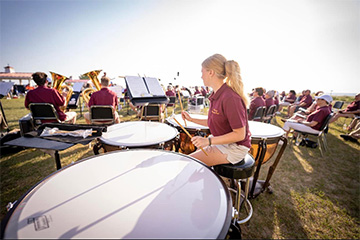Bachelor’s in music: Your stage for a future in music
For many students, music is a way to express themselves and connect with others. If that sounds like you, a bachelor’s degree in music at Central Michigan University can help you take the next step. Our program builds a solid foundation for careers in performance, education, arts leadership and more.
At CMU, you’ll have the chance to grow as a musician while exploring new opportunities such as developing your skills with your instrument, joining the jazz band or preparing to teach in the classroom. Students from any major with musical skills are also welcome to audition for our ensembles, including the Chippewa Marching Band. If you’re interested in creating original music, you can expand your studies even further with our songwriting minor.
From performance to education and songwriting, discover what music looks like at Central Michigan University.
What you’ll study
A bachelor’s in music blends performance, theory, education and history. You’ll study with faculty who are professional musicians and work alongside peers who share your passion.
Your coursework goes beyond lessons on your instrument or voice. You’ll also develop skills in theory, ear training, music technology, and music history. This well-rounded approach prepares you for graduate study or a variety of music-related careers.

Skills you’ll build
- Performance and ensembles: Gain experience in marching band, jazz, opera and more while learning to collaborate and perform with confidence. Students can also audition for the renowned Chippewa Marching Band, one of CMU’s most spirited traditions and one of the most recognized public faces of the university.
- Music theory and composition: Analyze music, write your own arrangements and create original works.
- Ear training and musicianship: Strengthen the aural skills needed for conducting, arranging and teaching.
- Music technology: Learn to work with recording equipment, digital audio labs and MIDI stations.
- Teaching and education: Build the foundation to step into a music classroom and inspire future musicians.

Why CMU?
- Community living: Be part of the School of Music Residential College, where you can live with other musicians and have access to practice rooms right where you live.
- Modern facilities: Study in a 119,000-square-foot building that includes a 500-seat concert hall, recital spaces, recording labs and digital technology.
- Countless performance opportunities: Take part in recitals, festivals, competitions and ensembles.
- Faculty mentors: Learn from experienced professors who bring both performance and teaching expertise.
- Strong career prep: With a 100% placement rate for music education graduates and an active alumni network, you’ll be supported well after graduation.

Career paths and salaries
Graduates of CMU’s music program find careers in performance, teaching, composition and administration. According to the Bureau of Labor Statistics:
- Musician / Singer: About $88,250 (based on $42.45/hour)
- Music Director / Composer: $63,670
- Postsecondary Music/Art Teacher: Around $83,980 (all subjects combined)
- Postsecondary Art, Drama & Music Instructor: Median $77,280; top earners over $167,000
- High School Teacher: $64,580
Take the next step
At Central Michigan University, you’ll be part of a supportive community that encourages creativity and growth. With access to state-of-the-art facilities, plenty of performance opportunities and dedicated faculty, you’ll feel ready to take on careers in performance, teaching, composition or music leadership.
Are you ready to turn your passion into a profession? Learn more about CMU’s music program and start your journey today.